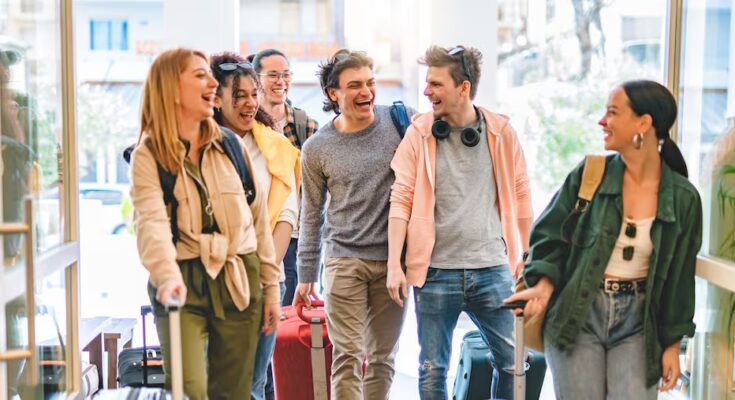They are called zoomerbecause they grew up in a time where everything moved at high speed. From the enjoyment of culture and production to sport, from work to training, to political commitment and active citizenship, the Civita XVI Report presented yesterday in Rome explores the relationship between emotional well-being and various areas of commitment for young people who, after adolescence, enter society. They’re not asking for “more things to do,” but real experiences, meaningful relationships, and credible adults. Therefore, “investing in their well-being means building an ecosystem that prioritizes quality, trust and shared planning.”
The relationship between consumption and perceived happiness
The survey, conducted in collaboration with SWG, shifts the focus from simply surveying young people’s actions to an analysis of how they live their experiences. All interviewees under 30 years of age had enjoyed some cultural offering in the past month, with personal consumption of audiovisual content (films, music, TV series, etc.) positioned as common (more than 9 out of 10) compared to reading (6 out of 10) and group cultural activities (cinema, museums, exhibitions, concerts, theater which achieved success rates between 37% and 55%). However, nearly 40% of participants perceived these practices with indifference and little enthusiasm, highlighting how the positive impact of culture on well-being is realized only if the culture is emotionally engaging, immersive and participatory. A direct link between consumption and perceived happiness (OHQ index) can in practice only be found in relation to audiovisual products. From this, strategic considerations for cultural actors will be derived: to strengthen the positive impact of culture on the emotions of the younger generation, it is not enough just to offer a rich and varied catalogue, but it is important to create ways of mediating results that integrate a strong component in the development of personal capacities (empowerment).
The severity of the vulnerability
Working conditions are also an important element in the lives of the younger generation: those who work consider their work to be very important, but often report that they have low levels of satisfaction, perhaps due to instability, a feeling of not being able to perform the tasks they are supposed to, or that they are not stimulating. Therefore, this Report considers it important to have intergenerational agreements that provide dignity and prospects for young people’s work. “From the Report it is clear that young people need real experiences, meaningful relationships and authentic dialogue with adults to feel heard, included and valued”, explained the Secretary General of the Civita Association Simonetta Giordani. «Promoting their emotional well-being means accompanying them in their active and conscious participation in social life, offering them support, orientation and a space where they can contribute to this». Even education, although considered a primary value, can trigger stress. Universities, however, are areas with relatively high levels of well-being, which confirms that having a recognized and coherent study pathway makes a positive contribution to individual balance.
Sports and volunteering
The relationship between the younger generation and sports activities is quite diverse. Sport, rated as not very important by only 2 out of 10 children, only produces beneficial effects if done with persistence and emotional participation. Space for active participation in social life, political commitment, volunteerism or associationism is the prerogative of minority groups. Similar to what is observed in artistic activities, even those who dedicate themselves more to social commitments tend to report slightly lower than average levels of well-being. This aspect leads us to reflect on the sense of frustration and impotence that can befall a generation of young people sensitive to collective problems and committed to change, who can feel a heavy emotional burden or unfulfilled expectations regarding the effectiveness of their initiatives.
“They live in times that move too fast”
A common thread emerges in all areas studied: well-being is not determined simply by the actions taken, but by how experiences are lived. Most young people approach proposed activities passively (“the activity does not arouse interest”) or with discomfort (“a reluctant obligation”); feeling free, motivated and actively involved in activities has been shown to be important for personal satisfaction. Peak satisfaction and maximum stimulation were recorded in cultural consumption and sports practice. At the same time, interpersonal support acts as a determining element: the quality of family relationships, mutual trust, the presence of educational figures, influential adults or mentors who are able to provide guidance and listen, are fundamental to transform the adolescent experience into an authentic growth opportunity. Among a younger generation that often describes itself as disillusioned, lonely, and fragmented, those who benefit from strong family ties and good social networks have significantly higher OHQ scores. “Young people live in a time that moves too fast, which promises everything but leaves no room to breathe. They grow up in a society that encourages them to be perfect, but rarely invites them to listen to themselves. They chase imposed ideals, models of success that remove the right to imperfection”, said the psychiatrist Emanuele Caroppo who signed the foreword to the Report. “Well-being, for them, is not an aesthetic goal, but rather a deep need for meaning. You don’t need to teach how to resist, but how to recognize yourself, how to resonate with who you really are.”



